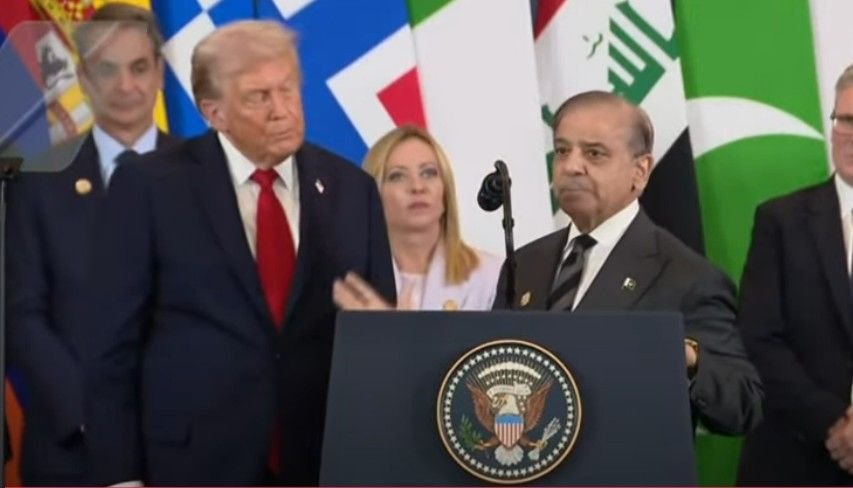Trump’s Dual Praise at Sharm el-Sheikh Peace Summit Draws Global Attention
Sharm el-Sheikh, Egypt – In a dramatic turn of diplomacy at the Sharm el-Sheikh Peace Summit, US President Donald Trump stirred both amusement and discomfort when he described Pakistan’s Army Chief General Asim Munir as his “favourite Field Marshal” before shifting gears to praise Indian Prime Minister Narendra Modi as a “very good friend.” The remarks came during a high-profile gathering of world leaders aimed at securing a ceasefire between Israel and Hamas in Gaza.
Addressing a packed audience, Trump first expressed gratitude towards Pakistan’s leadership, crediting both Prime Minister Shehbaz Sharif and the military establishment for their “constructive role in peace negotiations.” “Prime Minister Sharif of Pakistan, and I have to say my favourite Field Marshal from Pakistan, who is not here, but the Prime Minister is here,” Trump said, prompting visible awkwardness from Sharif, who stood behind him with a reserved smile.
A Diplomatic Moment Turns Awkward
Moments later, the US President pivoted to praise India and Prime Minister Modi. “Prime Minister Modi is a very good friend of mine. He’s done a fantastic job. India is doing great,” Trump said. Then, turning back to Sharif, he asked pointedly, “I think that Pakistan and India are going to live very nicely together, right?”
The unexpected question caught Sharif off guard, leading to a tense yet telling moment on stage. The Pakistani premier managed a polite smile while Trump continued, “They are, they are… and they’re two great leaders, great leaders as far as I’m concerned.” The exchange quickly went viral, drawing reactions from both Indian and Pakistani observers, many of whom viewed it as a reflection of Trump’s characteristic spontaneity and unpredictable diplomatic style.
Sharif Thanks Trump for ‘Stopping India-Pak War’
When it was his turn to speak, Shehbaz Sharif thanked Trump for what he described as “saving South Asia from the brink of war.” The Pakistani Prime Minister lauded Trump’s “decisive intervention” in defusing tensions earlier in May between India and Pakistan, saying, “I would like to again nominate President Trump for the Nobel Peace Prize for saving millions of lives not only in South Asia but also in the Middle East.”
Sharif credited Trump with mediating an end to the four-day conflict that erupted in early May, following India’s launch of Operation Sindoor on May 7. The Indian military operation targeted terror infrastructure in Pakistan and Pakistan-occupied Kashmir in retaliation for the April 22 Pahalgam terror attack that killed 26 civilians.
"I again, i would like to nominate this great President for the Nobel Peace Prize." : Shehbaz Shariff 🫣🤣
Theek hei ab Mera turn 👇
"Asim Munir is my favourite Field Marshal," : Donald Trump 🫢😂 pic.twitter.com/hskp9KcHns
— OsintTV 📺 (@OsintTV) October 13, 2025
Ceasefire Through Military Dialogue
After four days of drone and missile exchanges, the Directors General of Military Operations (DGMOs) from both sides reportedly held direct communication, resulting in a ceasefire agreement on May 10. While Islamabad maintains that Trump’s intervention was critical to achieving the truce, New Delhi has consistently asserted that the ceasefire understanding emerged solely through bilateral military channels, without third-party involvement.
India’s Ministry of External Affairs (MEA) has reiterated that “peace and stability in the region depend on the cessation of cross-border terrorism” and dismissed claims of external mediation as “inconsistent with India’s long-standing position.”
Trump’s ‘Peacebroker’ Image Gains Traction in Pakistan
Despite New Delhi’s firm stance, Trump’s reputation as a “peacebroker” has gained traction in Pakistan’s political circles. Islamabad has repeatedly cited the May ceasefire as evidence of Trump’s “unparalleled diplomatic influence.” Sharif’s government has even gone as far as nominating the US President for the Nobel Peace Prize, linking his efforts in South Asia with the ongoing Gaza ceasefire talks.
Observers note that Trump’s high praise for both India and Pakistan underscores his attempt to project himself as a global peacemaker ahead of a potentially contentious election season in the United States. Analysts also view his comments as part of a broader strategy to strengthen Washington’s leverage in the Middle East and South Asia simultaneously.
A Stage Set for Strategic Balancing
Trump’s remarks at Sharm el-Sheikh reflect his characteristic blend of flattery and provocation—aimed at keeping both New Delhi and Islamabad engaged while emphasizing US leadership in international peace efforts. For India, the recognition of Modi’s “fantastic job” reinforces its global image as a rising power. For Pakistan, the acknowledgment of its army chief and the perceived US endorsement offer a morale boost amid internal political challenges.
As the summit concluded, what began as a peace dialogue for Gaza ended up offering a glimpse into Trump’s evolving diplomatic playbook—one that continues to blend praise, unpredictability, and power projection on the world stage.








